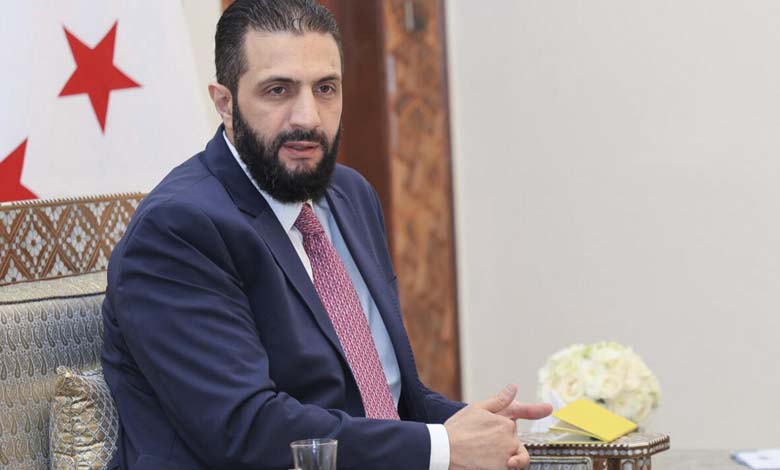Al-Sharaa begins dismantling the foreign jihadist file in response to Western pressure

General Security forces launched a large-scale operation on a camp housing foreign fighters in the city of Harem, in western Idlib. The operation resulted in several deaths and injuries, along with the arrest of French militants who had been fighting within extremist factions.
-
Al-Sharaa begins dismantling the foreign jihadist file in response to Western pressure
-
Al-Sharaa hands security in Sweida to Druze authorities to eliminate Israeli pretexts
During the night from Tuesday to Wednesday, General Security units carried out a sweeping raid on a camp of foreign fighters in Harem, western Idlib. According to the Syrian Observatory for Human Rights, the operation caused multiple casualties and led to the capture of French nationals fighting for radical groups.
This security campaign, targeting what is known as the “French Camp” — home to the Ghurabaa Battalion led by French-Senegalese jihadist Omar Omsen — marks the first direct field action against the presence of foreign jihadists in Syrian-held territories since the major political shifts that began in late 2024.
-
The Path to TreaKilling of 13 Alawites by Al-Sharaa Forces Rekindles Sectarian Woundsting Knee Pain May Begin in the Ear
-
Al-Sharaa Struggles to Assert Authority After Half a Year in Power
According to human rights reports and informed sources, this move comes as part of President Ahmed Al-Sharaa’s response to mounting Western — particularly French — pressure to repatriate citizens who joined extremist groups during the Syrian conflict. Al-Sharaa had previously pledged to eliminate French jihadist presence in Syria and hand over wanted individuals to Paris.
The operation, described by observers as “decisive and risky,” reflects a clear political strategy by Damascus to reshape its international image and distance itself from the heavy legacy of wartime alliances, especially with foreign fighters who were once a military asset but have since become a political and security liability.
-
Where Are Syria’s Muslim Brotherhood Headed? And What Is al-Sharaa’s Position Toward the Group?
-
Did Al-Sharaa Require U.S. Protection to Attend the Arab Summit in Baghdad?
Witnesses and field sources reported that fierce clashes erupted as soon as the camp was stormed. Security forces used light and medium weapons, resulting in casualties on both sides. Unconfirmed reports suggested that Omar Omsen — the main target — may have been injured or escaped.
Security sources stated that the raid followed intelligence reports warning of internal threats within the camp and of attempts by some members to plan attacks on government sites or escape toward the Turkish border. They stressed that priority was given to protecting civilians — particularly women and children — and preventing the fighting from spreading to other areas in northern Idlib.
-
Did Al-Sharaa Demand U.S. Protection to Attend the Arab Summit in Baghdad?
-
Israeli Airstrikes Near Presidential Palace to Warn al-Sharaa Over Targeting Druze
Despite its partial success, the operation has raised growing security concerns. Analysts fear it may trigger violent reactions from other jihadist groups, including those that had previously fought alongside Al-Sharaa’s forces. Some worry that this move could ignite a wave of rebellion among hardline militants who might see it as a betrayal of wartime alliances.
Indeed, according to the Syrian Observatory, Uzbek militants have already expressed their support for the French jihadists in their confrontation with General Security forces.
As search operations continue around the camp, sources within the “French Battalion” claim that this is not merely an arrest campaign but a systematic attempt to dismantle the Ghurabaa Battalion entirely and hand its members over to the French authorities.
-
ISIS Threatens al-Sharaa… Can the Group Still Operate in Syria?
-
Al-Sharaa Responds to Criticism of His Government: Satisfying Everyone Is an Impossible Task
In response, the group issued a statement accusing the Syrian government of “executing a foreign agenda,” asserting that the operations were being carried out in direct coordination with the United States and France as part of the international coalition against terrorism — a clear effort to build a counter-narrative justifying their resistance.
For President Ahmed Al-Sharaa, this move represents an extremely delicate domestic and international test. While he seeks to present himself as the leader of a “post-war Syria,” he must also distance his administration from its previous ties with radical factions that once served as tools of diplomatic leverage against Damascus. His earlier decision to integrate foreign jihadists into the Syrian army drew widespread criticism both at home and abroad.
-
Will Al-Sharaa Renew His Relationship with the Muslim Brotherhood or Exclude Them from the Political Scene?
-
The U.S. Administration and Syria: Caution and Skepticism Towards the New Regime Led by Ahmad Al-Sharaa
However, this current disengagement from foreign fighters may not come without cost. Groups that supported the regime’s survival during critical phases may view this crackdown as a betrayal of implicit understandings, increasing the likelihood of security chaos or even armed clashes among factions that were allies until recently.
Ultimately, the storming of the “French Camp” marks a turning point in the relationship between the Syrian regime and the international community, but it also confronts Damascus with serious internal challenges — chiefly, containing the fallout of this operation and preventing renewed instability in northern Syria, where conditions remain ripe for unrest and the sudden collapse of fragile wartime alliances.
-
Formation of a New Armed Group to Confront Ahmed Al-Sharaa – Details
-
Al-Sharaa Pledges to Form an Inclusive Government in His First Speech to Syrians
-
Syria after al-Assad: Will the new army turn into another version of “ISIS”?
-
Syria Urges the UN Security Council to Take a Firm Stance Against Israeli Airstrikes












